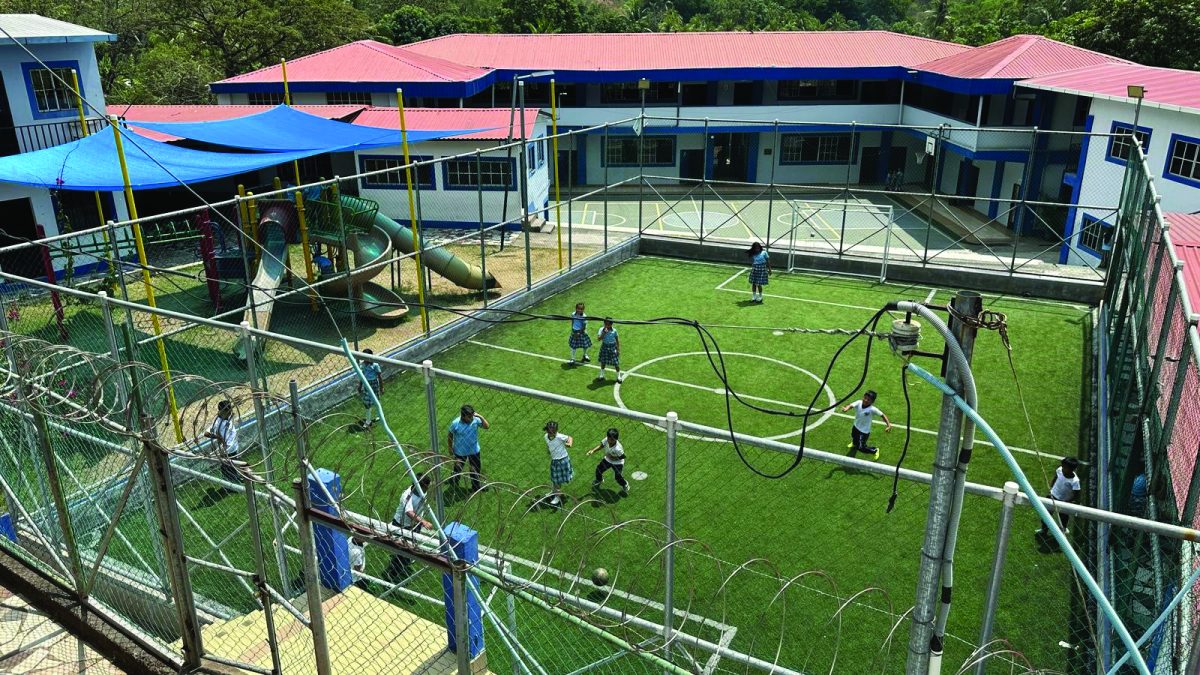
Courtesy image
The Remar campus includes a space for soccer play.
We all want someone to come home to, whether that is a guardian or some other form of significant other. Unfortunately, this world is cruel and unforgiving, but thanks to places like Remar it’s not all bad.
Remar is an orphanage in La Libertad, El Salvador. It houses 100 or so kids, from birth to 18 years old. Although the youngsters can leave whenever they want, most of the children live their whole lives there. Some even stay and volunteer there after they grow up. Some kids there had kids during their time at Remar, so they are able to take care of their children there. Remar is a safe haven for children from broken or abusive homes. There are only four main volunteers there, not including the head of the orphanage, Maria. The kids at the orphanage all have chores, things like taking care of their chickens and cows.
They have a lot of work out there and a lot of mouths to feed. They make money from the garden and the livestock they own; they also sell the plastics they use. Remar does not receive any money from the government; the government just gives the kids to them or takes them out.
El Salvador had a bad gang problem after their civil war in the ’80s. The gangs were a very large problem for its people; they controlled most of their lives and at one point there were hundreds of murders. The Pulitzer Center published a story by Kayli Plotner (March 20, 2016) about the orphans in El Salvador, Plotner wrote “As of January 2016, the homicide rate was 104 people per 100,000.” Obviously, something had to be done.
The president tried to throw the people in prison. If you had any kind of association with them, you would be incarcerated. Since there were so many gang members in jail, a lot of kids lost their parents. So, leaders put the children in the orphanages. As a result of all that, El Salvador had one of the highest orphan rates. Their government does not keep an official record of the orphan rate, so there is no official number.
Maria, the leader of the orphanage, said, “I see new kids coming in every few months, I’m always seeing new faces and giving up kids who have been here for years. We sometimes don’t get to build a bond with them, our president [Nayib Bukele] just puts them in and takes them out.” The sheer number of families under the poverty line and orphans was beginning to make the country as a whole look bad, so they put the kids back with their abusive families. The whole thing was a really bad situation.
Remar did its best for the kids they took care of, but the lack of money was a scary problem. Luckily, a family from Spain was touched when they saw what Maria was doing in Remar. The father gave them his support, and when he died, his daughter picked things back up for him. With the extra money they were able to obtain, they made Remar into a school for the public. There was another school in the area, but people began to flock to Remar. They were able to make more money from the school as well, so Remar is able to continue its good work. Remar started creating a good name for themselves.
During spring break, I went with a group from New Hope church to El Salvador. Fifty of us went, with the ages ranging from 10 to 70. As we flew into El Salvador, customs asked what we were doing in their country. When we said we were working with Remar, they knew exactly who we were talking about and said they do great work here. These kids can live fruitful lives due to Remar. Thanks to the hard and dedicated work of the volunteer work and the money they have obtained, the kids there feel seen, loved, and desired. Life is not always bright for them, but Remar makes it their goal to raise them up and send them out.
San Miguel is another orphanage in El Salvador, run by a family living there. They are both in their early 30s and have two kids who also live there. They have 22 other children that they take care of. This orphanage is up in the mountains near the center of the country. There are no other orphanages near their area, so it’s up to them to care for the surrounding area. They have very little money, but they make use of what they have. When we went to San Miguel, the 50 of us were split into two parts. Twenty-five people stayed back in La Libertad. I was there helping in San Miguel; we installed a shower, toilet and sink. We also gave money to add some lighting and equipment for cement. The kids there get their education from some other school.
The orphanage is a non-denominational institution. These guys don’t have much, but they all seemed to be full of joy, seeing light in even the darkest of places. The children at both orphanages are a testament to the idea that less is more. Thanks to places like these, the kids can keep smiling.
Logan Brown is a student in the spring Media Writing class. During spring break 2025, he made the trip to El Salvador with a New Hope church group.